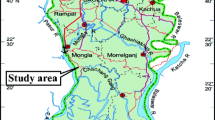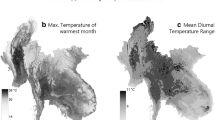Abstract
Time and again, climate change is a global phenomenon; intrinsically affects people and the environment more at the local and the global level when driven anthropogenically. Due to multiple reasons, the coastal region is more vulnerable to ongoing and forthcoming climate change. The study was conducted to develop a framework and to discuss the perception of fishery-based farmers and their response to the climate-induced crisis through their management practices. It is well known that preventing climate change is costly; alternatively, measures can be initiated to mitigate its adverse effects on humans as well as on the ecosystem. The importance of utilizing the internal physical, social, and psychological aspects of a farming community to deal with crisis management efficiently has been unearthed in this study. It is understood that climate-induced crisis management is contributed by psycho-socio-economic factors associated with the farmer and his environment. The computing effects of these exogenous variables may lead to the emergence of hybrid, moribund, socio-economic structures, which may increase the tendency of farmers for vulnerability to climate change. Analysis of these variables affecting crisis management will help to identify and undertake practical approaches to alter the favourable and manipulable variables connected with crisis management. The results are more relevant for farmers, extension professionals, governmental agencies, Non-Government Organizations, and scientists who play a definite role in the management of crisis-induced by climate change.

Similar content being viewed by others
Availability of data and material
we will submit on request.
References
Abid, M., Scheffran, J., Schneider, U. A., & Ashfaq, M. (2015). Farmers’ perceptions of and adaptation strategies to climate change and their determinants: The case of Punjab province, Pakistan. Earth System Dynamics, 6, 225–243. https://doi.org/10.5194/esd-6-225-2015.
ADB (Asian Development Bank) (2012). Addressing Climate Change in the Asia and Pacific Region. Technical Assistance Report. https://www.adb.org/sites/default/files/publication/29662/addressing-climate-change-migration.pdf.
Anonymous (2006). The Economics of Climate Change: Stern Review. The Summary of conclusions. Survey of the Environment 2007, The Hindu: pp. 141–145.
Anonymous (2007). Climate Change: The Physical Science Basis. Extracts from the IV Assessment Report. Survey of the Environment 2007, The Hindu, pp. 147–155.
Brammer, H. (1987). Drought in Bangladesh—lessons for planners and administrators. Disasters, 11(1), 21–29.
Bunch, R. (2011). Africa’s soil fertility crisis and the coming famine. State of the World.
Economic Survey of Karnataka. (2016). Economic Survey of Karnataka—2015–16, Department of Planning, Programme Monitoring & Statistics Government of Karnataka. https://des.kar.nic.in/docs/Economic%20Survey%202015-16_English%20Final.pdf.
Foley, J. A., Ramankutty, N., Brauman, K. A., Cassidy, E. S., Gerber, J. S., Johnston, M., et al. (2011). Solutions for a cultivated planet. Nature, 478(7369), 337–342.
Godfray, H. C. J., Beddington, J. R., Crute, I. R., Haddad, L., Lawrence, D., Muir, J. F., et al. (2010). Food security: The challenge of feeding 9 billion people. Science, 327, 812–818.
Hodgetts, R. M. (1979). Management: Theory, process and practice (pp. 239–242). London: W.B. Sanders company.
IFPRI (International Food Policy Research Institute) (2009). Impact of climate change on agriculture—Factsheet on sub-Saharan Africa. Washington, DC: IFPRI; FAO. 2003. World Agriculture towards 2015/2030. Rome: FAO/Earthscan.
IPCC (Intergovernmental Panel on Climate Change). (2001). Climate change, Synthesis report. Cambridge: Cambridge University Press.
IPCC (Intergovernmental Panel on Climate Change) (2007). Climate Change 2007: Synthesis Report. Contribution of Working Groups I, II and III to the Fourth Assessment Report of the Intergovernmental Panel on Climate Change. Geneva, Switzerland 72.
IPCC (Intergovernmental Panel on Climate Change) CZMS (1992). ‘A common methodology for assessing vulnerability to sea level rise’, 2nd revision, in IPCC CZMS, Global Climate Change and the Rising Challenge of the Sea, Report of the Coastal Zone Management Subgroup, Response Strategies Working Group of the Intergovernmental Panel on Climate Change, Ministry of Transport, Public Works and Water Management, The Hague, Appendix C.
Jaiswal, N. K. (1965). A Study of Factors Associated with Low Level of Adoption of Improved Agricultural Practices. Ph.D. Thesis (Unpub.), Department of Agricultural Extension, IARI, New Delhi.
Juma, C., Tabo, R., Wilson, K., & Conway, G. (2013). Innovation for sustainable Innovation for Sustainable Intensification in Africa, The Montpellier Panel, Agriculture for Impact, London. https://ag4impact.org/wp-content/uploads/2014/07/MP2013_0047_Report.pdf.
Justus, F. E., Hobbs, D. J., & Campbell, R. R. (1968). Measuring management performance of dairy farmers. Canadian Journal of Agricultural Economics, 26(1), 51–63.
Kerlinger, F. N., & Pedhazur, E. J. (1973). Multiple Regression in Behavioral Research. New York: Holt, Renehart and Winston Inc.
Lobell, D. B., Burke, M. B., Tebaldi, C., Mastrandrea, M. D., Falcon, W. P., & Naylor, R. L. (2008). Prioritizing climate change adaptation needs for food security in 2030. Science, 319(5863), 607–610.
MEA (Millennium Ecosystem Assessment). (2005). Ecosystems and Human Well-being: Synthesis. Washington: Island Press.
Mertz, O., Mbow, C., Reenberg, A., et al. (2009). Farmers’ perceptions of climate change and agricultural adaptation strategies in rural Sahel. Environmental Management, 43, 804–816. https://doi.org/10.1007/s00267-008-9197-0.
NSSO (2016). Annual Report 2016-17. Government of India Ministry of Statistics and Programme Implementation, New Delhi. http://mospi.nic.in/sites/default/files/publication_reports/mospi_Annual_Report_2016-17.pdf.
Nyong, A., Adesina, F., & Elasha, O. (2007). The value of indigenous knowledge in climate change mitigation and adaptation strategies in the African Sahel. Mitigation and Adaptation Strategies for Global Change, 12, 787–797.
Osbahr, H., Dorward, P., Stern, R., & Cooper, S. (2011). Supporting agricultural innovation in Uganda to respond to climate risk: Linking climate change and variability with farmer perceptions. Experimental Agriculture, 47(2), 293–316. https://doi.org/10.1017/S0014479710000785.
Parry, M., Evans, A., Rosegrant, M. W., & Wheeler, T. (2009). Climate change and hunger: responding to the challenge. World Food Programme, the International Food Policy Research Institute, the New York University Center on International Cooperation, the Grantham Institute at Imperial College London, and the Walker Institute, University of Reading (United Kingdom).http://cdm15738.contentdm.oclc.org/utils/getfile/collection/p15738coll2/id/17143/filename/17144.pdf.
Pradhana, N. S., et al. (2017). Farmers’ perception of effective drought policy implementation: A case study of 2009–2010 drought in Yunnan province, China. Land Use Policy, 67, 48–56. https://doi.org/10.1016/j.landusepol.2017.04.051.
Rao, K. P. C., Ndegwa, W. G., Kizito, K., & Oyoo, A. (2011). Climate variability and change: Farmer perceptions and understanding of intra-seasonal variability in rainfall and associated risk in semi-arid Kenya. Experimental Agriculture, 47(2), 267–291.
Sekhon, G. (1968). Differentials in Perception of Attributes of Innovations. Ph.D. Thesis (Unpub.), Department of Rural Sociology, Pennsylvania State University, USA.
Simoes, A. F., Kligerman, D. C., La Rovere, E. L., Maroun, M. R., Barata, M., & Obermaier, M. (2010). Enhancing adaptive capacity to climate change: The case of smallholder farmers in the Brazilian semi-arid region. Environmental Science & Policy, 13(8), 801–808.
Thornton, P. K., Jones, P. G., Eriksen, P. J., & Challinor, A. J. (2011). Agriculture and food systems in sub-Saharan Africa in a 4 °C + world. Philosophical Transactions of the Royal Society, 369, 117–136.
Tilman, D., Balzer, C., Hill, J., & Befort, B. L. (2011). Global food demand and the sustainable intensification of agriculture. Proceedings of the National Academy of Sciences, 108(50), 20260–20264.
UNEP. (1991). Environmental problems of the Marine and Coastal areas of Maldives. UNEP: National Report.
Vinaya Kumar, H. M., Chauhan, N. B., Patel, D. D., & Patel, J. B. (2019). Predictive factors to avoid farming as a livelihood. Economic Structures, 8(10), 1–19. https://doi.org/10.1186/s40008-019-0141-7.
VinayaKumar, H. M., Shivamurthy, M., Govinda, Gowda V., & Biradar, G. S. (2017). Assessing decision-making and economic performance of farmers to manage climate-induced crisis in Coastal Karnataka (India). Climatic Change, 142(1), 143–153. https://doi.org/10.1007/s10584-017-1928-x.
Von Braun, J. (2007). The World Food Situation: New Driving Forces and Required Actions, Food Policy Report. Washington: International Food Policy Research Institute.
Wheeler, T., & von Braun, J. (2013). Climate change impacts on global food security. Science, 341, 508–513.
Xu, X., Zhao, T., Liu, F., Gong, S. L., Kristovich, D., Lu, C., et al. (2016). Climate modulation of the Tibetan Plateau on haze in China. Atmospheric Chemistry and Physics, 16, 1365–1375.
Young, Lu. (2010). A preliminary study on farmers’ perception and determinants to climate change based on a case from China. Journal of Environmental Research and Development, 5(2), 431–442.
Acknowledgement
We want to thank the farmers, agriculture, horticulture, and fishery department, and local officers of the research area for their support during the data collection and fieldwork. We are also thankful to the University of Agricultural Sciences, Bangalore, for providing the favourable environment for data analysis and writing this manuscript.
Funding
The authors thankful to the University of Agricultural Sciences, Bangalore, and the Indian Council of Social Science Research (ICSSR) for funding the study.
Author information
Authors and Affiliations
Contributions
The principal author (VK) conceptualized the idea, define the methodology, designed data collection personal interview instruments, carried out the primary data collection and analysed the collected data, and wrote the manuscript. The second author (SM) participated in the research design, standardize the data collection procedure, technical guidance in the data analysis through the appropriate statistical procedure, and proof of the draft manuscript.
Corresponding author
Ethics declarations
Conflict of interests
The authors declare that they don’t have competing interests.
Additional information
Publisher's Note
Springer Nature remains neutral with regard to jurisdictional claims in published maps and institutional affiliations.
Rights and permissions
About this article
Cite this article
Hebbsale Mallappa, V.K., Shivamurthy, M. Factor influencing fishery-based farmers’ perception and their response to climate-induced crisis management.. Environ Dev Sustain 23, 11766–11791 (2021). https://doi.org/10.1007/s10668-020-01141-x
Received:
Accepted:
Published:
Issue Date:
DOI: https://doi.org/10.1007/s10668-020-01141-x




